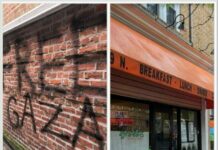Antisemitic incidents declined in Pennsylvania and South Jersey in 2021, according to the Anti-Defamation League.
On April 26, the ADL released its annual report on antisemitic incidents in the United States. The national numbers were grim, with 2,717 offenses, the highest total since the ADL started keeping track in 1979. It was also a 34% increase from 2020.
But the local numbers were less grim. Pennsylvania saw 69 incidents in 2021 compared to 101 the year before. South Jersey, despite a statewide increase in New Jersey, experienced 26 offenses last year versus 34 in 2020. (The ADL defined South Jersey as any county from Burlington south.)

A drop is good, said ADL Philadelphia Director Andrew Goretsky, but 65 and 26 instances of antisemitism, respectively, are still more than zero.
“I often think about medicine, when they say the risk factor, 98% of people have no problems, but 2% of people die,” he added.
In the Keystone State, Goretsky was most concerned about two findings.
Assaults, the most serious category tracked by the ADL, increased from two in 2020 to four in 2021. And in May of 2021 during the conflict between Israel and Hamas, the number of overall offenses doubled, from four to eight, from the same period the previous year.
The director couldn’t say why assaults increased. But he could identify a reason for the May jump.
“The May conflict was a reminder that Jews are routinely blamed for Israel’s actions,” Goretsky said.
In addition to assaults, Pennsylvania experienced 49 incidents of harassment, defined by the ADL as cases when Jews “were harassed with antisemitic slurs, stereotypes or conspiracy theories.” It also witnessed 16 vandalism offenses, or “cases where property was damaged along with evidence of antisemitic intent.”
South Jersey saw four vandalism acts and 17 harassment offenses.
Some of the more high-profile incidents in Pennsylvania and South Jersey occurred in the Philadelphia area.
Pennsbury School District board members received a series of antisemitic emails and threats while working on policies relating to the pandemic, like masking for students. The ADL mentioned that case specifically in its Pennsylvania report.
And in December, a South Jersey synagogue, Congregation Adath Emanu-El in Mount Laurel, and school, Marlton Middle, saw antisemitic messages displayed in the parking lot and bathroom, respectively. Both had swastikas and chilling statements like “Hitler was right” and “We are everywhere.”
Those incidents and others revealed not just the prevalence of antisemitism today but the multifaceted nature of it, according to Goretsky.
Attacks on Jewish property are an issue, as evidenced by the rise of security as a priority for Jewish federations and synagogues across the country. But it’s also an issue with a clear and pretty reliable response strategy, as evidenced by the rise of security as a priority.
Virtual attacks like Zoom bombs and threatening emails are prevalent today but present a different issue. How do you combat an anonymous emailer or Zoom bomber other than with defensive methods in the moment, like blocking the address or restarting the chat?
It’s a question with no easy answer.

But according to Linda Palsky, one of the Pennsbury board members who received threatening messages, the ADL report is at least a place to start.
“It’s our only weapon to bring light to it,” she said. “To try and make people aware that it’s not acceptable behavior and language.”
The multifaceted nature of antisemitism today underscores a scary reality for modern Jews: There might not be any safe spaces anymore.
According to Goretsky, the ADL’s national study showed that attacks increased by 106% at K-12 schools, 61% at synagogues and 21% on campuses. To a large degree, too, those incidents did not come from white supremacists on the far right or Israel despisers on the far left. Only 14% came from far-right individuals or groups, and only 12% came from the far left, while 65% emerged from people in the middle.
Rabbi Benjamin David of Adath Emanu-El believes that Jews today need to be prepared for antisemitism from all angles.
“You can be attacked while sitting in the comfort of your own home staring at your laptop,” he said.
Even in this increasingly complicated environment, though, the post-World War II ethos should not change for Jews, David explained. Jews can’t take these offenses lying down.
“If those who hate are going to be loud, then we simply have to be louder,” David said.
“To be a Jew in the real world today means to be an advocate for peace, an ally of other people, to be a defender of religion itself, its expression,” he concluded. “The game has changed.” JE






